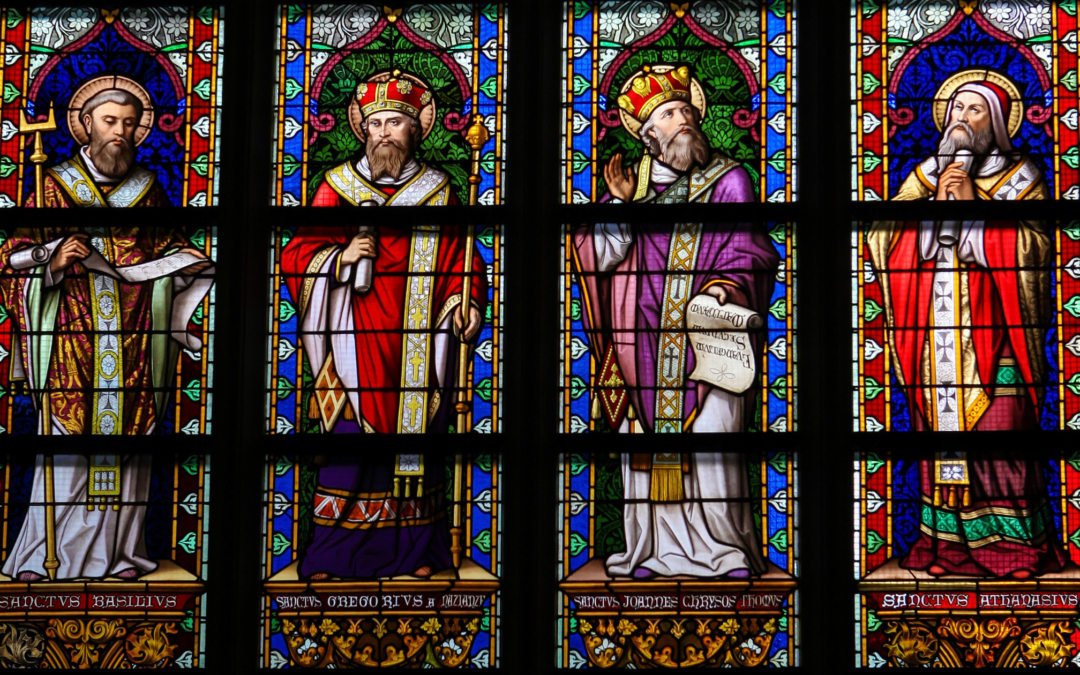Why Theology is More Than a “Subject” with Mike Creavey
Theology As a School Subject
Today, I am chatting with Mke Creavey, who teaches theology for Homeschool Connections. Mike is a super impressive guy: a U.S. Army vet with degrees from both The Catholic University of America (BA) and Franciscan University of Steubenville (MA) and a background in religious education and youth ministry. He’s also the author of Return of the Lord: Narrative Reflections on the Apostles’ Final Moments. Today I am interviewing Mike about theology, specifically about why it shouldn’t be considered just another “subject.”
First off, let’s define our terms. What exactly is a “subject” in an academic environment?
As usual, I think a great deal of light can be shed on all this by taking a closer look at some etymology. The English word “subject” derives from the early 14th-century French word subget, which meant “‘a person under control or dominion of another,’ especially one who owes allegiance to a government or ruler.” Going further back to the Latin subiectus “lying under, below, near bordering on,” we can better comprehend why the word has come to be utilized to describe varying fields of academic study, each with their own distinct boundaries or limits of scope as “subjects” nested underneath a broader educational curriculum.
Hence, our contemporary expectation to see students’ (and teachers’) schedules list things like Chemistry, English Literature, Geometry, and Theology side by side each semester. In other words, we understand education to be a significant endeavor consisting of smaller elements like puzzle pieces that, when assembled, should give the learner a comprehensive picture of reality. In this view, it is easy to view subjects as means to an end—parts of the whole.
Is there anything wrong with viewing educational disciplines in this manner?
I personally don’t like to think about education this way because I’ve seen it lead to a disjointing, disintegrating experience. In my academic life, I have become increasingly convinced that God, as a loving Creator, has made his creation to be one enormous, wonderful, mysterious, diverse, but, fundamentally united reality. Psalm 19:1-2 says, “The heavens declare the glory of God; the firmament proclaims the works of his hands”.
Everything is connected—absolutely everything. Paul tells the Colossians, “For in him were created all things in heaven and on earth” (Col 1:16). In his Gospel’s prologue, John says, “All things came to be through him, and without him nothing came to be” (Jn 1:3). This means that all aspects of creation are sustained in being and illuminated by the Creator from whom they all spring. The all-too-frequent trend in modern education is to break creation up into component parts for in-depth analysis while forgetting how it all fits together in an integrated whole, like deconstructing a house into a million parts and then forgetting there ever was a house, to begin with.
I would imagine this sort of fragmentation might make it difficult for students to understand the relevance of what they are learning in “the big picture”?
Precisely! This is how we end up with the familiar “When am I going to need this?” and “What does English literature have to do with my college and career future?” gripes from so many students. What does algebra have to do with the Electoral College? What does photosynthesis have to do with the quadratic formula? Why should I know who Genghis Khan was and also what a treble clef is? Too much “subjectification” can and often does
transform education from what should be the glorious soul-expanding endeavor of a lifetime into boring, materialistic, reductionistic, utilitarian drudgery.
Well, let’s bring this to theology. What is “theology,” and what do you think makes it so different from other fields of study?
When it comes to theology, I sincerely think it’s essential to understand how different it is from every other academic discipline. Theology was classically dubbed “Queen of the Sciences,” and this reveals some notion of its governance over the other sciences and areas of study. I like to think that there is an implicit responsibility at the heart of theological study—a responsibility to trust that God guides one’s study, calling the student to a more authentic awareness of God’s design. St. Anselm of Canterbury referred to theology as fides quaerens intellectum—“faith seeking understanding”; and St. Augustine spoke of “believing that I might understand.” So, right away, I would point out that there is much more going on in theological study than the mere acquisition of information, data, or skills.
The definition I typically share with my students at the beginning of the year goes like this: “Theology—From the Greek theo (“God”) and logos (“word”), the study of God and his interaction with creation, especially human beings. Classically described as ‘faith seeking understanding,’ theology seeks to understand God better to respond to him more adequately and enter more deeply into a relationship with him.”
Ideally, theology should be like a bright light shining ever more brightly across the vast landscape of human experience. Because it is always focused on more perfectly aligning the human being with God himself, theology ought to illuminate all subjects of human attention and inquiry and, ideally, help us to enter more deeply into the interconnected mystery of creation and how all aspects of it bear witness to God’s glory.
Why is this distinction so important, in your opinion?
Now, I want to be careful here. I’m not the only one who’s interested in thinking of theology as something other than “a subject.” In 1993, renowned evolutionary biologist and mega-famous atheist Richard Dawkins said: “What has Theology ever said that was of the smallest use to anybody? … If all the achievements of theologians were wiped out tomorrow, would anyone notice the smallest difference? … Even the bad achievements of science … work. The achievements of theologians don’t do anything, don’t affect anything, don’t achieve anything, don’t even mean anything. What makes you think
‘theology’ is a subject at all?”
Yikes! From Dawkins’ perspective, theology is not something worth taking seriously enough to even include it as a worthwhile endeavor of human rational inquiry. I profoundly disagree with him. For me, it’s not that theology isn’t “a subject” but that it is fundamentally more than one subject among many. One of my biggest pet peeves is when theology’s distinctiveness is recognized, but it is followed by the assumption that it should be a walk in the park. Why? I have heard it repeatedly from parents, students, and other teachers. “How could Johnny be failing Creavey’s class? I mean, it’s theology, for crying out loud!” In other words, how could anyone have a difficult time in a class about love, togetherness, kindness, rainbows, tolerance, and stuff?
Suffice it to say, I firmly believe that if we simply envision theology as a subject equally lined up with other academic subjects, we will utterly miss the soul-magnifying potential that theological study is meant to unlock.
What do you propose is the best way for people to understand theology’s place in education?
When we set out to study theology, we ought to begin with humility (as we should in all things!). Let me share two fun anecdotes. In my office I have a little desk nameplate that reads “Master of Theology”. I always tell people that this is meant to be a joke. I don’t think there is such a thing as a “master” of theology. The deeper into the Great Mystery I plunge, the more I realize how out of my depth I really am, and how grateful I need to be to God for absolutely everything!
This was all previewed for us perfectly by Dr. Scott Hahn in the very first class I had with him in grad school. He memorably recommended to us that if we ever felt inclined to think too highly of ourselves during our advanced theological studies, we should quickly recall a rather vivid image. “Picture yourself,” he said, “at your desk surrounded by books and ink bottles and feather pens, wrapped in a mantle with the skull nearby to remind you of your own death. Go for it! Picture yourself as the holiest, most serious theologian you can imagine… and then imagine you’re wearing a diaper!”
The message was simple—this academic endeavor is not ultimately about what you can get out of it. It’s about allowing God to take the reins so you can come to discover what He can get out of you! That’s not easy—in many ways, it’s the hardest work I’ve ever done. The demands theology will make on your heart and your mind are not insignificant. But it is absolutely worth the struggle!
Ultimately, I think studying theology is about growing in wisdom and virtue more than growing in knowledge. Who are we? Why are we here? Why are we humans even capable of education, and what is the purpose of it all? Is this life really meant to be singularly focused on acquiring knowledge and skills that can enable us to live comfortably? Or is there much, much more? Is there a way to study all of my subjects with a theological mindset that helps me see them all as one divinely illuminated, integrated pursuit?
What further resources would you recommend to students and parents to reflect more deeply on all of this?
These musings are all simply meant to whet the reader’s whistle, and it’s hard to pick a single next step to recommend. Here are a few great texts you may want to look into for various related reasons. (NOTE: There is a wide variety of ages and education levels represented here, but all are
phenomenal texts):
The Nature and Mission of Theology by Joseph Ratzinger (Pope Benedict XVI):
Theology and Sanity by Frank Sheed
Orthodoxy by G. K. Chesterton
Chance or the Dance?: A Critique of Modern Secularism by Thomas Howard:
Also, feel free to get in touch with me! There is nothing about which I’m more passionate than growing closer to Our Lord and exploring all that he enables me to understand about him, his will, and his plan for all of creation and us in particular. I invite you to contact me and to take my Homeschool Connections courses so we can journey together!
You can learn more about Mike Creavey and his course offerings at his instructor bio page on the Homeschool Connections website.
*This article contains affiliate links






